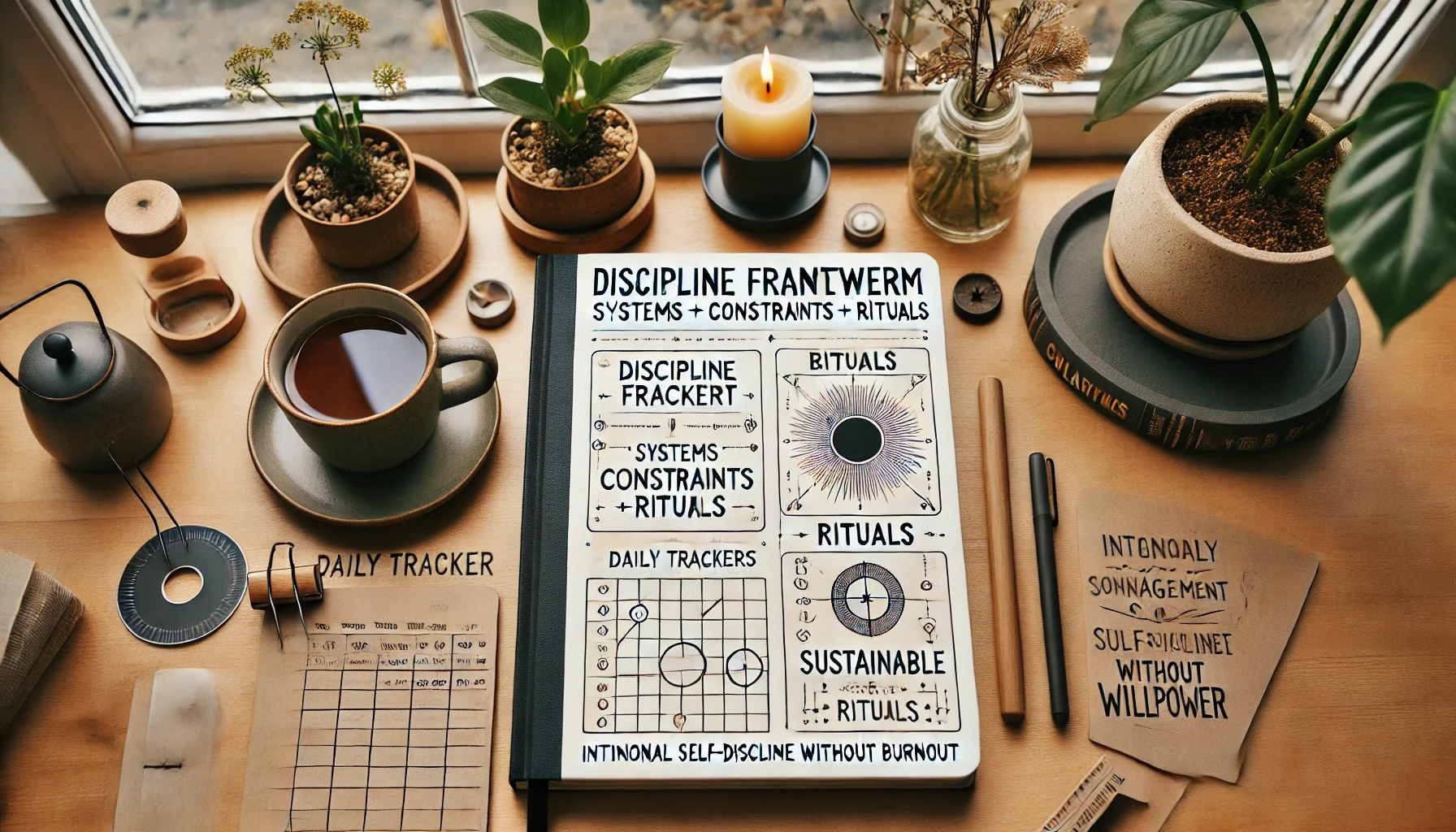Discipline is often praised as the cornerstone of success. But most people misunderstand how it actually works. They treat discipline like brute force—an act of pushing through no matter what. The problem? Willpower is a limited resource, and relying on it exclusively leads to burnout, inconsistency, and frustration.
In reality, the most disciplined people aren’t constantly pushing. They’ve built systems, habits, and environments that make self-control easier—and often effortless. This article breaks down the neuroscience, psychology, and practice of developing sustainable discipline—without draining your energy or relying on constant motivation.
Why Willpower Alone Is Not Enough
According to research by Roy Baumeister, willpower functions like a muscle. It gets fatigued with overuse. Every time you resist temptation, make a decision, or push through mental resistance, you use a bit of willpower. This is known as ego depletion.
Signs you’re over-relying on willpower:
- You feel mentally exhausted by noon
- You procrastinate on important tasks
- You’re highly productive in the morning but fall apart in the evening
- You need caffeine or dopamine boosts (scrolling, snacking) to keep going
The most successful people protect their willpower by minimizing the number of decisions they make and automating their discipline with structure and intention.
The Three Pillars of Sustainable Discipline
To develop real, lasting discipline without burnout, you need to structure your behavior around three core principles:
1. Reduce Friction (Make Good Choices Easier)
People don’t fail because they lack willpower—they fail because their systems create resistance. Your environment should help you succeed automatically.
Examples:
- Lay out your workout clothes the night before
- Keep healthy food visible and junk food out of reach
- Use website blockers to prevent distraction during deep work hours
- Pre-plan your day so you don’t rely on last-minute decisions
Discipline isn’t about effort—it’s about reducing the energy cost of doing the right thing.
2. Build Identity-Based Habits
Discipline becomes easier when it’s part of who you are. Instead of forcing behaviors, anchor them in identity.
Example mindset shifts:
- “I’m trying to write more” → “I’m a writer”
- “I need to be more consistent” → “I’m someone who honors commitments to myself”
- “I should work out” → “I’m the kind of person who moves daily”
Identity-based discipline is self-reinforcing. You don’t need to convince yourself to act—you simply align with who you believe you are.
3. Use Strategic Energy Management
Discipline fails when we ignore energy rhythms. You don’t need to be productive all day—you need to be effective when it counts.
Practical strategies:
- Identify your peak focus hours (often 9–11 AM or 2–4 PM)
- Reserve those hours for high-leverage work
- Schedule tasks based on cognitive load, not just urgency
- Use breaks and movement to reset your brain
This isn’t laziness—it’s working with your biology, not against it.
The Discipline Equation: Systems + Constraints + Rituals
Here’s how high performers think about discipline:
Discipline = Systems + Constraints + Rituals
Systems:
- Morning and evening routines
- Task management workflows
- Time blocking and deep work protocols
- Habit tracking
Constraints:
- Digital limits (e.g., no phone before 9 AM)
- Environmental design (single-purpose workspaces)
- “If-then” rules (e.g., “If I skip a workout, I stretch instead”)
- Public commitments and accountability partners
Rituals:
- Pre-work focus cue (music, candle, breathing)
- Shutdown ritual at the end of the day
- Weekly planning session
- Gratitude or review journaling
When these components are aligned, discipline feels less like force—and more like flow.
Willpower Replenishment: How to Recharge Your Mental Energy
Discipline requires recovery. Just as you wouldn’t train a muscle every day without rest, you can’t sustain discipline without refueling your mind.
Recovery strategies:
- Sleep: The #1 willpower booster—aim for 7.5–8 hours
- Nutrition: Blood sugar crashes impair decision-making—eat balanced, whole foods
- Nature exposure: 20 minutes outside significantly restores attention and executive function
- NSDR (Non-Sleep Deep Rest): Guided meditation or yoga nidra enhances focus and mental reset
- Social connection: Healthy relationships buffer stress and restore willpower
Recovery isn’t optional—it’s a discipline in itself.
Building the “Discipline Flywheel” (How to Scale Self-Control Over Time)
The secret to sustainable discipline is momentum. When you feel progress, your brain releases dopamine—not just for rewards, but for anticipation of success.
Here’s how to build your flywheel:
- Choose one simple habit to anchor your identity
- Track it visibly—use a habit tracker, app, or paper
- Celebrate consistency, not perfection
- Review weekly: What helped you stay consistent? What didn’t?
- Stack behaviors over time: Once one habit is stable, build the next
Example:
Daily 10-minute stretch → Daily 20-minute workout → Daily healthy meal prep → Weekly meal planning → Full health ritual system
Each layer builds self-efficacy and compounds your self-trust.
Avoiding the Extremes: Where Most People Fail
Discipline fails at the extremes—rigidity or chaos.
Signs of rigidity:
- You can’t adjust your schedule without guilt
- Missing one habit feels like failure
- You’re all-or-nothing about routines
Signs of chaos:
- No structure, no routines, no awareness of energy
- Reacting to the day instead of designing it
- Starting over every Monday without long-term growth
The solution is flexible structure—a disciplined core with room for adaptation. Like bamboo: firm, but able to bend.
Final Thoughts
Discipline isn’t about punishing yourself into productivity. It’s about creating conditions for success, designing your environment, and managing your energy so that the right actions become the default—not the exception.
It’s not about willpower—it’s about architecture.
When you design your days around systems, rituals, and identity, discipline stops being a struggle and starts being a source of power.
Because in the end, you don’t rise to the level of your goals—you fall to the strength of your systems.
